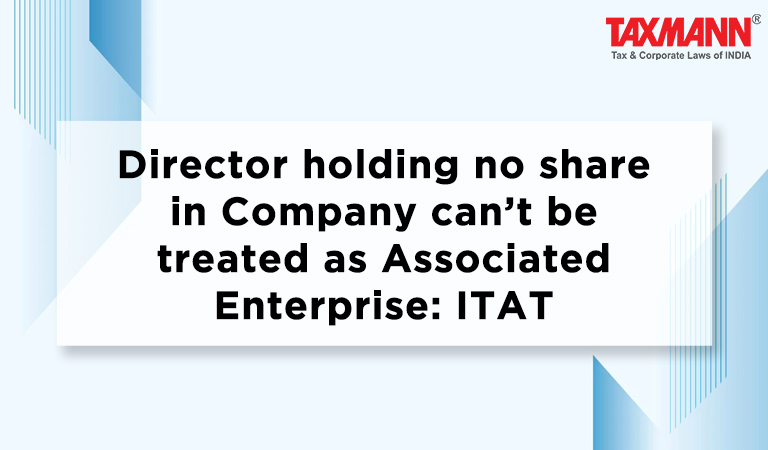Director holding no share in Company can’t be treated as Associated Enterprise: ITAT
- Blog|News|Transfer Pricing|
- 2 Min Read
- By Taxmann
- |
- Last Updated on 11 November, 2022

Case Details: DCIT v. Reliance Industrial Holdings (P.) Ltd. - [2022] 144 taxmann.com 180 (Mumbai-Trib.)
Judiciary and Counsel Details
-
- Pramod Kumar, Vice President & Sandeep S Karhail, Judicial Member
- Vatsalaa Jha & Chetam MKacha for the Appellant.
- Madhur Agarwal, Nimesh Vora & Moksha Mehta for the Respondent.
Facts of the Case
Assessee-company provided guarantee to ICICI Bank Singapore on behalf of Biomatrix Marketing Pvt Ltd. (BMPL). The director of the assessee-company had 91% shareholding in the BMPL on whose behalf guarantee was given by the assessee company.
The Assessing Officer (AO) held that the books of account of assessee revealed that one of its director, who was a ‘Key Managerial Person’ as per books of account, had 91% shareholding in BMPL at the time of deal. Thus, assessee-company and BMPL, become Associated Enterprise (AE) for the purpose of transfer pricing.
Accordingly, he made ALP adjustments for the guarantee provided by the assessee to the Bank. Aggrieved-assessee preferred an appeal to the CIT(A) which upheld the order of AO. Matter reached before the Mumbai Tribunal.
ITAT Held
The Tribunal held that a person can be said to be in control of a company merely because he is a director of the company, or he is described as a ‘key managerial person’ of the said company in its own choice of words in the annual accounts.
To be said to be in control of another company, a person should hold more than 26% of the voting power of the company or such a person appoints more than half of the directors or members of the governing board or one or more of the executive directors or members of the governing board.
The connotations of ‘control’ in the scheme of Section 92A(2) are far more cogent than visualized by a simplistic notion of ‘key managerial person’. In the instant case, there was no material or substantive indication to the effect that the assessee ‘is controlled by an individual, i.e., the director named as Key Managerial Person.
Unless AO was to give reasons for holding that the assessee-company was controlled by director, Section 92A(2)(j) could not have been invoked.
Disclaimer: The content/information published on the website is only for general information of the user and shall not be construed as legal advice. While the Taxmann has exercised reasonable efforts to ensure the veracity of information/content published, Taxmann shall be under no liability in any manner whatsoever for incorrect information, if any.

Taxmann Publications has a dedicated in-house Research & Editorial Team. This team consists of a team of Chartered Accountants, Company Secretaries, and Lawyers. This team works under the guidance and supervision of editor-in-chief Mr Rakesh Bhargava.
The Research and Editorial Team is responsible for developing reliable and accurate content for the readers. The team follows the six-sigma approach to achieve the benchmark of zero error in its publications and research platforms. The team ensures that the following publication guidelines are thoroughly followed while developing the content:
- The statutory material is obtained only from the authorized and reliable sources
- All the latest developments in the judicial and legislative fields are covered
- Prepare the analytical write-ups on current, controversial, and important issues to help the readers to understand the concept and its implications
- Every content published by Taxmann is complete, accurate and lucid
- All evidence-based statements are supported with proper reference to Section, Circular No., Notification No. or citations
- The golden rules of grammar, style and consistency are thoroughly followed
- Font and size that’s easy to read and remain consistent across all imprint and digital publications are applied



 CA | CS | CMA
CA | CS | CMA
